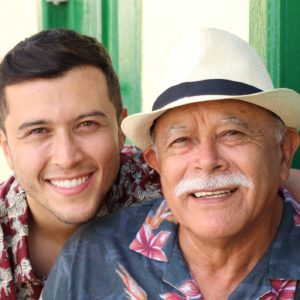“Dad Had Heart Disease. Will I?”
January 29, 2021

February is American Heart Month—a great time to learn more about things that promote cardiac wellness. During the past few decades, research has refined our understanding of heart health. One area of study is genetics. Experts have identified many genes that, alone or in combination with others, affect a family’s risk of conditions such as unhealthy cholesterol levels, aneurysms, and abnormal heart rhythms.
Today more people are getting genetic tests. Learning more about our genes can be a mixed bag. Knowing that we have a higher risk of certain health conditions can help us plan for the future. It can help our doctors pinpoint a diagnosis and tailor treatment.
On the other hand, many people report experiencing a sense of dread and even inevitability when they find they have an increased risk of heart problems. It’s important for them to know that genes aren’t destiny! Even if their mother, father or other immediate blood relatives had heart disease, there’s much they can do as individuals to lower the risk.
Though we can’t change our genes, the American Heart Association (AHA) says that even people with a genetic predisposition for heart disease can cut the risk with various lifestyle choices, such as eating well, maintaining a healthy weight, and being a non-smoker. And they recently reported on a study from Stanford School of Medicine which showed that the top defense against heart disease for these patients is exercise.
The Stanford team, headed by medical school professor Dr. Erik Ingelsson, looked at the genetic data of half a million people and found that among people who had a genetic predisposition for heart disease, those who exercised had a 36% lower risk of coronary heart disease and 46% reduction in atrial fibrillation, compared to people in the study with lower fitness levels. These results cut across age, gender, ethnicity, socioeconomic status, and other variables.
“The main message of this study is that being physically active is associated with a lower risk of heart disease, even if you have a high genetic risk,” said Dr. Ingelsson.
Families share not only genes but lifestyles
When it comes to exercise, the sooner we begin, the better. Families with a history of heart disease should encourage younger family members to adopt a lifelong exercise habit, taking part in activities they enjoy, and avoiding a couch potato lifestyle. In this way, good habits can be passed down right along with those less-desirable genes!
Then, stay at it through life. Talk to your doctor about your genetic risk, and ask for a physical activity “prescription” that’s right for you. There’s an exercise plan that’s right for almost everyone. And you needn’t go to the gym to get an extra dose of exercise. Experts say walking the dog, gardening, even standing up rather than sitting while working or talking on the phone can help us accumulate a healthy amount of physical activity every day.
People who are living with heart disease also benefit from exercise. For these patients, it is doubly important to work with a trained expert to be sure exercise is safe and beneficial. People who have other health conditions that make it challenging to exercise, such as surgery, stroke, or chronic illnesses can benefit from physical therapy services.
Ridgeview Transitional Rehabilitation offers a large and fully equipped therapy gym and expert staff who help guests choose safe and appropriate physical activities, no matter what health challenges they are facing.
